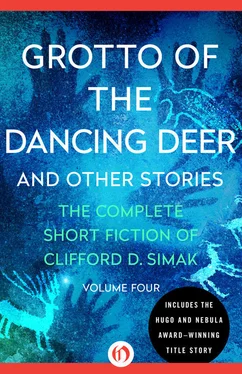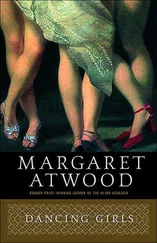Doc tilted a bottle of bocca and drank. He waved the bottle at Bob.
“Want a snort?” he invited.
Bob shook his head. “Too early in the morning to start drinking,” he explained.
“Listen,” said Doc, “any time of the day or night is the proper time to drink in New Chicago. Hell, drink is the only excitement we have around this dump. Only fun I ever had since I been here was when old Jake Hansler died. Interesting case. Something he caught on Mars. Bug bit him or something. Wish he had lived longer so I could have studied it better. People blamed me for him dying. Said I was drunk. Wouldn’t have made any difference, though, because it was a funny disease.”
He helped himself to another long one.
“Jake Hansler,” said Bob. “That name sounds familiar. I’ve heard it somewhere before.”
“Sure you have,” said Doc. “Dr. Jacob Hansler, the great botanist.”
“That’s it,” said Bob. “I remember that he died on Venus.”
“He came here to do some experimental work and to study some of our plant life,” Doc rumbled. “Queer old fellow. Folks here didn’t like him any too well, because he wouldn’t pay much attention to them. But he talked to me. Got to be good friends. He told me a lot about what he was doing, but I can’t remember much about it now. He brought a bunch of seeds here that he found on Mars. Found them in the ruins of an old laboratory dating back to the Genzik dynasty. The seeds were all dried up and most of them wouldn’t grow, but some of them did and he nursed them along. Claimed those seeds were thousands of years old. He brought them here, because he figured the soil and climate on Venus were just right for plant life. Said if a plant wouldn’t grow on Venus it wouldn’t grow anywhere.”
“What happened to the plants after Dr. Hansler died?” Bob asked.
Doc snorted.
“You ought to see the damn things now,” he said. “They’re regular pests. Growing all over town. Just weeds now. One of them is a sort of rose, with big purple blooms. Real pretty flower and the women around town sort of coddle them along for the bouquets. Not that they need much coddling. Then there’s another one that’s sort of a wild pea. Pretty good eating. Then there’s the polka-dot weed. Makes a right good dish of greens. Got spinach beat all hollow.”
“Dr. Hansler sounds like an interesting person,” said Bob.
“Mighty funny old duck,” said Doc, wagging his head. “Had all sorts of funny notions. Obstinate old cuss. Other botanists told him the seeds he got on Mars wouldn’t grow. They must of been over 5,000 years old. But he thought they would and he tried them and they did. That’s him all over.
“He had another idea, too, that everybody laughed at, but he died believing that it was the truth. It wasn’t exactly in his line of work and so he never said a great deal about it. He told me, though. You know about the Genzik dynasty, don’t you?”
Bob nodded. “Took a course in Martian history in school,” he said.
“Well,” said Doc, “you’ll remember, then, that the Genzik dynasty was composed of a group of scientists that practically ruled Mars. They must have been old hell-cats for a fact, because the Martians rose up and rebelled against them and, history tells you, wiped out every last one of them. They destroyed all the laboratories the Genziks had set up and did everything possible to erase any memory of them. As a result there isn’t much known about them now.”
“Martian history suggests they were only a higher Martian race,” said Bob. “I know there’s all sorts of myths about them.”
“Well, sir,” said Doc, “Jake had a myth about them that would knock your hat off. He claims that a few of them escaped the general massacre and fled to the deserts and that their descendants are still there. Got it from desert tribes who claimed to know all about it. And Jake thought the Genziks were Earth people, maybe folks from Atlantis, who had reached Mars thousands of years ago, long before the present Terrestrial race sent a spaceship there.”
“That’s a new one,” said Bob. “Never heard that before. Have you got any of Jake’s notes around here? Did he leave any books or anything?”
Doc chuckled. “Looking for a story, I see,” he said.
“The chief will sure give me hell if I don’t get something on this trip,” Bob told him, “and you certainly haven’t helped me any with this Hunger Disease business.”
Doc finished off the bottle with gusto, then held it up to the light and sighed. “There’s one story you could write,” said Doc, setting the bottle on the window ledge, along with several others. “A story that should be written. It’s about those farmers here. The Venus Land Company brought them out. Knew they couldn’t grow a thing, but that didn’t stop those sharks. Took everything those poor devils had and dumped them in the jungle here. It does beat hell how the new land racket will get the suckers. Venus Land cooked up this farm scheme and sold it to a bunch of poor Iowa farmers. The worst of it is that the farmers don’t even own the land they’ve built their homes on. Some of them came up to see me about getting their money back. You know how it is—they figure a doctor knows everything, not ever dreaming how damn little some doctors do know. I looked over their contracts. Far as I can see they’re airtight. But I found the farmers settled on the wrong tract of land. I asked them how they knew what land they had bought and they told me a company representative staked it out for them. They settled on the east side of town and the land they bought is on the west side.”
“Do they know about this?” Bob asked.
Doc shook his head. “No, I didn’t tell them,” he said. “Don’t suppose it makes much difference. Venus Land won’t bother them any more. They got all the boys had and the land is worthless anyhow.”
Boots clumped on the stairs and in a moment Angus MacDonald loomed in the doorway. “Doc,” he said, “Steve Donagan’s kid is sick again.”
Doc heaved out of his chair.
“If some of the rest of the people in New Chicago were like Susan,” he said, “maybe I could gain back some of my self-respect. She’s the only one who ever gets sick around here.”
“Doc,” said Angus and one could sense stark terror in his voice.
“Yes, yes, go on,” snapped Doc. Angus swallowed and started over again. “Doc,” he said, “Steve thinks she’s got that Hunger Disease.”
Johnny Mason, wire editor, laid a slip of yellow paper on Editor Hart’s desk. “A special just out of New Chicago,” he explained.
Hart snapped up the paper and read:
“NEW CHICAGO, VENUS—THE HUNGER DISEASE, TO WHICH IT WAS BELIEVED THIS REMOTE TRADING POST WAS IMMUNE, STRUCK HERE TODAY. THE VICTIM IS SUSAN DONAGAN, NINE-YEAR-OLD DAUGHTER OF MR. AND MRS. STEPHEN DONAGAN.
DR. ANDERSON TROWBRIDGE, THE TOWN’S ONLY DOCTOR, A FRIEND OF THE FAMILY WHO BROUGHT SUSAN INTO THE WORLD AND HAS ATTENDED HER THROUGH A LONG SERIES OF CHILDHOOD DISEASES, SAID THAT—”
Hart flung the paper down on the desk.
“Johnny,” he said, “right now, you’re looking at the biggest damn fool in the newspaper business. I got a hunch and sent Bob out there after a big story. He isn’t there more than ten hours and the story is all shot to hell.”
Zeke Brown and his wife, Mary, sat on the doorstep of their cabin and gazed out over their farm.
Night was closing down over the land and in the jungle night-things were awakening. Howls, roars, bellows and yelps mingled to make the night hideous. Zeke shivered as he listened and his hand crept to the butt of his gun. For five years he had heard this nightly chorus of hate and murder, but it always brought tremors of terror with each coming of darkness.
Читать дальше












